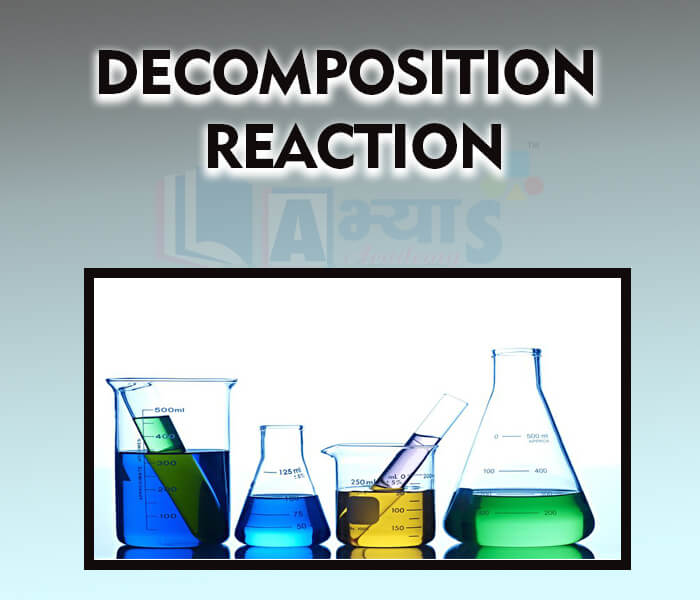Decomposition Reaction







Decomposition Reaction
Decomposition Reaction:
A reaction in which a single reactant breaks down to form two or more products,is known as decomposition reaction. This reaction is opposite to combination reaction. On the basis off the form of energy required for the reaction, these reactions are of three types:
(i) Thermal decomposition
These reactions use the energy in the form of heat for decomposition of the reactant, e.g.
(a) Calcium carbonate on heating, decomposes to give calcium oxide and carbon dioxide. Calcium oxide is used for manufacturing of cement.
Calcium carbonate Calcium oxide + Carbon dioxide
(Limestone) (Quick lime)
Which of the following are correct ? (a) Thermal decomposition reactions use the energy in the form of heat for decomposition of the recant. (b) Ferrous sulphate on heating gives ferric oxide, sulphur dioxide and sulphur trioxide . | |||
| Right Option : C | |||
| View Explanation | |||
________________ reactions use the energy in the form of heat for decomposition of the recant, | |||
| Right Option : A | |||
| View Explanation | |||
Which of the following are correct ? (a) A reaction in which a single recant breaks down to form two or more products,is known as decomposition reaction. (b) Electrolysis reactions involve the use of electrical energy for the decomposition of the reactant molecules. | |||
| Right Option : C | |||
| View Explanation | |||
Students / Parents Reviews [10]
My experience with Abhyas is very good. I have learnt many things here like vedic maths and reasoning also. Teachers here first take our doubts and then there are assignments to verify our weak points.

Shivam Rana
7thMy experience with Abhyas academy is very good. I did not think that my every subject coming here will be so strong. The main thing is that the online tests had made me learn here more things.

Hiya Gupta
8thAbhyas is a complete education Institute. Here extreme care is taken by teacher with the help of regular exam. Extra classes also conducted by the institute, if the student is weak.

Om Umang
10thIt was good as the experience because as we had come here we had been improved in a such envirnment created here.Extra is taught which is beneficial for future.

Eshan Arora
8thOne of the best institutes to develope a child interest in studies.Provides SST and English knowledge also unlike other institutes. Teachers are co operative and friendly online tests andPPT develope practical knowledge also.

Aman Kumar Shrivastava
10thMy experience was very good with Abhyas academy. I am studying here from 6th class and I am satisfied by its results in my life. I improved a lot here ahead of school syllabus.

Ayan Ghosh
8thIt has a great methodology. Students here can get analysis to their test quickly.We can learn easily through PPTs and the testing methods are good. We know that where we have to practice

Barkha Arora
10thI have spent a wonderful time in Abhyas academy. It has made my reasoning more apt, English more stronger and Maths an interesting subject for me. It has given me a habbit of self studying

Yatharthi Sharma
10thIt was a good experience with Abhyas Academy. I even faced problems in starting but slowly and steadily overcomed. Especially reasoning classes helped me a lot.

Cheshta
10thA marvelous experience with Abhyas. I am glad to share that my ward has achieved more than enough at the Ambala ABHYAS centre. Years have passed on and more and more he has gained. May the centre flourish and develop day by day by the grace of God.
